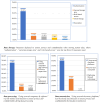Examine frameworks policies and strategies for effective information governance in healthcare organizations
- PMID: 40644477
- PMCID: PMC12250644
- DOI: 10.1371/journal.pone.0327496
Examine frameworks policies and strategies for effective information governance in healthcare organizations
Abstract
Background study: Health information, over the years, has been regarded as one of the crucial assets in the landscape of health on the grounds of the myriads of benefits derived from it. It plays a major role in policy planning and implementation, quality improvement, clinical decision-making, care continuity, disease surveillance, etc., making it an integral part of healthcare delivery. This substantiates the pressing need for an appropriate information governance (IG) system, ensuring proper data stewardship, measures to ensure data quality and that preserving the privacy and confidentiality of patient data are in place. As part of conscious efforts to improve health information governance, this study examines the entire information governance structure of healthcare facilities used as study areas, taking into account the effectiveness of data stewardship, data quality management and compliance with regulatory requirements.
Methodology: Employing a cross-sectional study design, data was collected from 432 healthcare professionals emanating from Cape Coast Teaching Hospital (CCTH), Eastern Regional Hospital Koforidua (ERHK) and Ledzokuku-Krowor Municipal Assembly (LEKMA) Hospital, all in Ghana. A semi-structured questionnaire, demarcated into five (5) parts, was used to collect the data. Closed-ended questions were analyzed with Stata 15.0 involving frequencies, percentages, means, standard deviation, standard errors and confident intervals. A chi-square test of independence was deployed to ascertain relationships between variables. Open-ended questions were coded and analyzed with Qualitative Data Analysis Miner 6.0, deploying inductive thematic analysis.
Results: The level of understanding of data stewardship (2.87/4.0), familiarity with concepts of data quality (2.73/5.0) and ethical considerations and privacy (3.13/5.0) when dealing with patient health data were found to be varied among the professionals, overall rated as moderate and affirming the need for improvement. The level of knowledge and understanding on these pertinent areas were highly influenced by type of profession (p < 0.001; p = 0.031 and, p < 0.001) respectively and been indicative that some type of health workers is much concerned about data stewardship and health information governance than others. Various methods and efforts were in place to ensure the quality of data; however, hampering these attempts included factors such as poor data collection methods, lack of resources, inadequate competency and some behavioral factors. In addition to these factors is the low level of training on data stewardship (1.86/4.0), which heavily leads to skewness in knowledge. The majority of healthcare professionals were familiar with and advocated for adherence to regulatory requirements such as HIPAA (33.7%), GDPR (21.3%) and HITECH Act (14.4%), in making data governance much robust. Efforts were also identified in ensuring privacy and confidentiality during the storage, processing and transmission of patient data mostly by deploying methods such as authentication (58.9%), use of secured computers and software (71.2%) and using secure electronic platforms (66.0%) respectively indicating a keen attention for data stewardship and governance. About 70% of healthcare professionals attested to the regular conduct of monthly compliance audits, however, the rate of training on data stewardship was discovered to be very low (1.86/4.0).
Conclusion: There is an existence of clear policies and procedures to guide data stewardship to enhance overall information governance, however, healthcare professionals' level of knowledge on subjects of information governance ought to be enhanced. There is a need to intensify training sessions on data quality, and regulatory requirements for health information governance to mitigate the gaps in knowledge among professionals.
Copyright: © 2025 Okyere Boadu et al. This is an open access article distributed under the terms of the Creative Commons Attribution License, which permits unrestricted use, distribution, and reproduction in any medium, provided the original author and source are credited.
Conflict of interest statement
The authors have declared that no competing interests exist.
Figures


References
-
- Rouzbahani F, Rabiei R, Asadi F, Moghaddasi H, Emami H. Information governance program: a review of applications in healthcare. Arch Adv Biosci. 2019;20(1):10. doi: 10.22037/jps.v10i1.23597 - DOI
-
- Winter JS, Davidson E. Big data governance of personal health information and challenges to contextual integrity. Inf Soc. 2018;35(1):36–51. doi: 10.1080/01972243.2018.1542648 - DOI
-
- Al-Badi A, Tarhini A. Exploring big data governance frameworks. Elsevier. https://www.sciencedirect.com/science/article/pii/S1877050918318313 2018. Accessed 2024 March 13
-
- Tse D, Chow C. The challenges of big data governance in healthcare. explore. Ieee. https://ieeexplore.ieee.org/abstract/document/8456108/. 2018. Accessed 2024 March 12
-
- O’Hara K. Data trusts: Ethics, architecture, and governance for trustworthy data stewardship. 2019. https://eprints.soton.ac.uk/428276
MeSH terms
LinkOut - more resources
Full Text Sources
Medical
Research Materials
Miscellaneous

